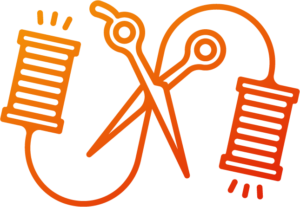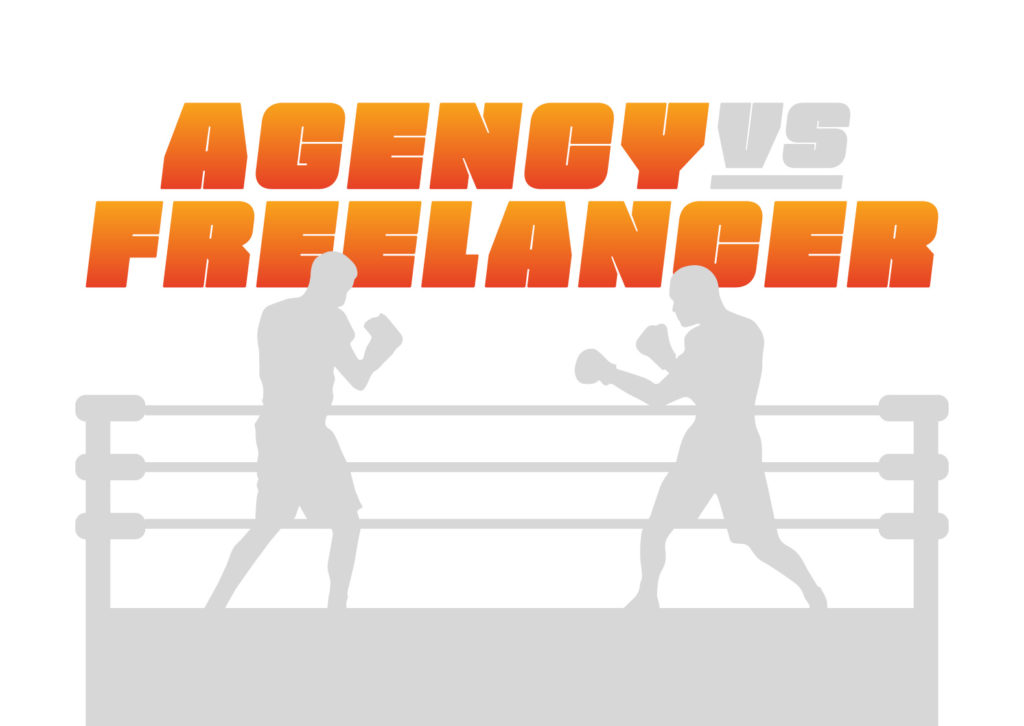Whether you’re building a new website or a complex software system, getting started isn’t easy. In fact, finding the right development partner is arguably the hardest and most important part of the entire process. To begin sifting through your options, consider the ideal size of your development team. Which is better for your project: independent experts or a cohesive team of professionals? While the question of agency vs freelancer seems trivial, its importance cannot be overstated. Choosing between an agency and a freelancer can fundamentally reshape the final product for better or for worse. Let’s dive in and examine which is better for your project.
Agency vs Freelancer: What’s the Difference?
A freelancer is a self-employed individual who specializes in a certain aspect of the project. Some freelancers will focus on an entire process, such as development, while others will focus on a tiny piece. As a project grows, you may need to hire more freelancers to focus on different pieces. That’s where agencies enter the picture. The role of an agency is to provide customers with a network of experts to meet growing demands for broad expertise. While freelancers are independent, agency employees are part of a larger company and have experience working together under a single brand. Each development option has unique strengths and weaknesses, so the best solution depends on the specifics of your project.
Freelance Pros
Low Price

Freelance development is always significantly cheaper than agency development. While an agency has to worry about overhead costs, such as the building and insurance, a freelance developer often needs little more than a computer and plenty of caffeine. As a result, freelancers take advantage of their small expenses and set rates that are notably lower than agencies.
High Flexibility

Since a freelancer does not have to juggle anyone else’s schedule, they can usually work with much more flexibility. Many have no problem working outside of regular hours and will respond to communications at any hour of the day. This flexibility often results in speedier delivery.
Ample Involvement

Want to make major changes to your project last minute? Since a freelancer has a lot of individual flexibility, they will likely be able to make changes as soon as you send an email. And if you hire multiple freelancers to work on different parts of a single project, you will naturally become the central hub for managing tasks and responsibilities. Not everyone wants this role; sometimes, it’s better to sit back and let the pros do the work. However, freelancers and small agencies usually provide more choices than massive development companies.
Specialization

Since an individual can only know so much, most freelancers specialize in a certain field. Some freelancers will focus on development, others will focus on design, and some will even focus on QA. If you can think of a job, you can find a freelancer who specializes in it (as long as you know what to look for). This hyper-specialization can be a good or bad thing. If you need someone to work on a specific one-time part of a project, specialization is beneficial. However, if you need to develop a complex system requiring multiple specializations, you will either need to hire multiple freelancers–which can be a good thing depending upon your project–or take a broader approach.
Freelance Cons
Limited Capacity

One person can only handle so much work. If you ask too much of a freelancer, you run the risk of overloading them, which could severely impact their performance.
Similarly, since freelance developers tend to specialize, they may not be able to work on every piece of your project. If you want to build an app, for instance, it will be extremely difficult to find a freelance developer who can design, code, and test the entire system economically without sacrificing quality.
Of course, you could hire several freelancers, but then your cost starts to rise. Additionally, you will have to maintain communications and quality standards with all of them, and you may need to work twice as hard to integrate all the parts.
High Risk

Many other “agency vs freelancer” discussions paint an image of an evil freelancer who will sabotage your project. While that nightmare scenario is not impossible and does occur on rare occasions, it is hardly the biggest risk to worry about.
Freelancers are risky not because they will fill your website with bugs and malware, but because they are only one person. Your freelance developer could be the most trustworthy person available, but if they get sick, go on vacation, or encounter a personal emergency, your entire project enters limbo. And if you don’t have a contingency plan in the event of an accident or uncontrollable interference, the project could fall apart entirely.
Hire freelancers for…
- small one-and-done projects
- hyper-specialized tasks
- projects that need your heavy involvement
- low-budget jobs
Agency Pros
Teamwork

If you hire one or more freelancers, there is no guarantee that they will cooperate. However, agency employees work together on a daily basis, resulting in an unparalleled level of teamwork and cooperation. They are so familiar with one another’s strengths, weaknesses, and work habits that they can effortlessly navigate around major roadblocks. Simply put, an agency is a pre-built team that has worked together for many years. The employees have honed their development strategy down to a science, and no matter how many freelancers you hire, they will never gain the same level of cooperation that an agency guarantees.
Broad Expertise

Even the most talented individual can only know so much, so if your project requires multiple areas of expertise, an agency will be much more helpful. The most obvious reason that agencies cover more ground is that they have more people. Each individual employee can specialize in a certain phase of development so that you do not have to seek out additional people. And since agencies can work on your product from start to finish, they can also provide long-term benefits, such as maintenance, marketing, feature add-ons, and other goodies.
Low Maintenance

If your project expands to the point in which you need multiple freelance professionals, managing them all is difficult. You must maintain communication and quality standards between people that may not know one another or work well together, and that puts lots of pressure on your shoulders.
However, an agency does all that work for you. Instead of personally managing multiple freelancers, you get a project manager who orchestrates communication between in-house experts who cooperate on a daily basis. Compared to a rudimentary freelance network, agencies are a well-oiled machine.
Low Risk

Since a freelancer is an individual, the entire project will grind to a halt in the event of unexpected interferences. And in a worst-case scenario, an online freelancer could hypothetically walk away from a project and leave you stranded. In either situation, you don’t have any hope of recovering if you don’t have a contingency plan.
On the other hand, an agency is more stable and resilient. It cannot walk away or leave unexpectedly because it isn’t a single person. If you want to discuss a problem, you can always call the office or schedule a visit. Since an agency is a grounded business, it is more official and professional in most circumstances.
High Quality

Freelancers do not produce low-quality products as a rule, but agencies usually hold themselves to more rigorous quality standards. While a freelancer can submit a project upon completion without so much as an afterthought, agencies often employ strict review and QA processes. Even if a freelancer does QA a product, they likely lack the resources of an agency. What independent freelancer has several phones lying around for testing?
Agency Cons
High Cost

An agency will always be more expensive than a freelancer. Not only must an agency pay more people, but it also must consider large overhead costs, such as equipment, software, insurance, and office space. Freelancers, on the other hand, are unbound by massive fixed costs and may flexibly set rates much lower than agencies. Additionally, an agency will primarily focus on larger projects than a freelancer. Larger projects cost more.
Potentially Low Involvement

While you can change the entire course of a freelance project through an email, an agency usually has a strict process for communicating changes and new ideas. This is especially true for very large hands-off agencies. Sometimes, low involvement is a good thing; you can set your specifications and walk away. And other times, you may find that a smaller agency allows you to give plenty of input. Fyresite, for instance, uses the one-of-a-kind spec sheet process to maximize transparency and customer input. So before settling on a large agency, a small agency, or a freelancer, research your development partners and choose what’s best for your company.
Hire an Agency for…
- complicated multi-phase projects
- products requiring a broad area of expertise
- fast-paced high-quality solutions
- medium or high-budget jobs
Still not sure which option to choose? Contact us online or give us a call at 888.221.6509 to discuss your project and find out which solution is right for you.
 Jason Turnquist
Jason Turnquist 

